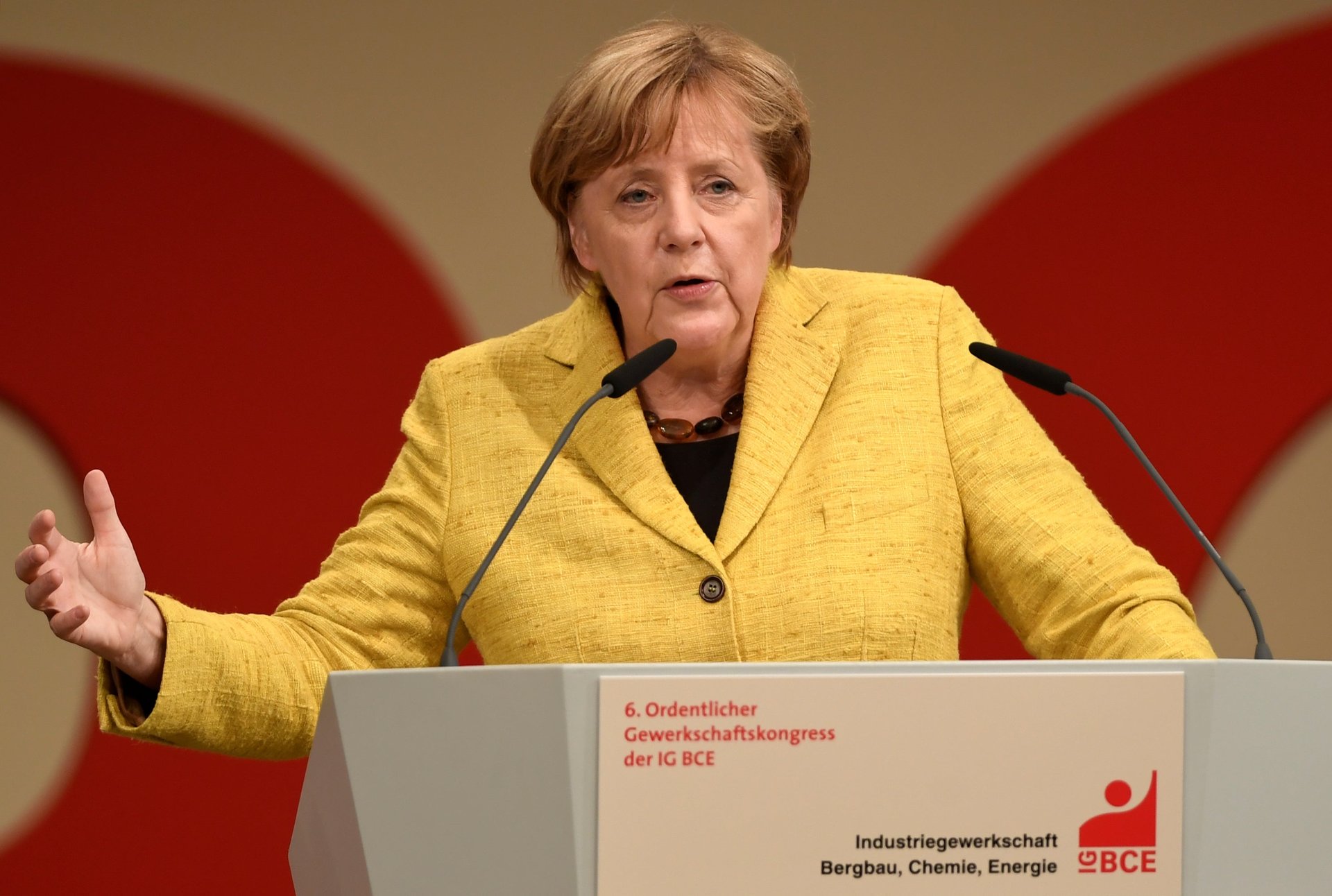Germany heads for “Jamaica” as three-way coalition talks begin
German chancellor Angela Merkel begins talks today (Oct. 18) to form a three-way coalition government with two parties—the Free Democrats and the Greens—who have historically been enemies.


German chancellor Angela Merkel begins talks today (Oct. 18) to form a three-way coalition government with two parties—the Free Democrats and the Greens—who have historically been enemies.
A disappointing result for the Christian Democratic Union (CDU) in September’s general election left the German chancellor with only one realistic option as far as forming a majority government goes: a coalition between her conservative bloc (the CDU and the Christian Social Union in Bavaria), the liberal, pro-business Free Democrats, and the environmentalist Greens.
The effort to form a “Jamaica” coalition—so called because the parties’ individual colors match the Jamaican flag—promises intense wrangling between three sides with dramatically different agendas. The pressure is on for Merkel to make this work, since the alternative is a minority government, which Germany has never had, or another election, which no one wants.
Itinerary
Today is the kickoff for the “sounding out” talks ahead of knuckling down to hammer out who gets which ministerial posts and finding common ground on policy issues. The CDU meets with the FDP and Greens separately on Wednesday, then the FDP and Greens meet each other on Thursday, before all the parties come together for the first time on Friday and start the Herculean task of getting to a coalition agreement.
The negotiations are expected to take weeks and could even run on into early 2018. There’s no legal limit to the length of time the talks can last, and, with around 50 people involved, it promises to be a complicated process.
Some of the key hurdles are likely to cause heated debate over the next weeks include the Greens and Free Democrats’ wildly differing policies on refugees, climate goals, and European integration.
Migrants

Germany’s future refugee policies are going to be front and center for all involved. Merkel has been criticized frequently by her CSU sister party for her open-door refugee policy during the height of the refugee crisis in 2015. CSU leader Horst Seehofer blamed her for causing the party’s “right flank” to be exposed in the election, allowing the right-wing Alternative for Germany to lure away discontented CDU voters and enter the federal parliament for the first time.
The chancellor gave in this month and agreed to set an upper limit for refugees at 200,000 per year—to the dismay of the Greens, who slammed Merkel’s move as inhumane and said that no such limit could be part of the coalition agreement.
The FDP takes a tougher stance on refugees, and wants them to be sent back home once the situation in their home countries becomes safe. FDP leader Christian Linder told Bild newspaper in September that refugee applications to enter the EU should be submitted first in the refugee camps of North Africa. “We must put more pressure on the Maghreb states to take back people who are illegally staying in our country,” Lindner said. “Otherwise, there will be no foreign aid.”
Climate
The environmentalist Greens need to stick to their climate-protection principles, or face the wrath of their voters. In September, its co-leader Cem Özdemir said: “We will not enter in any coalition without a clear priority for climate protection, without a strong Europe and without society solidarity.” The Greens are insistent that Germany needs to phase out coal power and push the automotive industry away from combustion engines towards electric vehicle development.
The FDP’s climate-policy goals reflect their pro-business stance: they want to see a market-oriented rather than a state-subsidized model for the move to renewable energy and to meet the Paris Climate Accord goals
European Union
While the Greens will be pushing for deeper integration among EU member countries of the European Union, the Free Democrats feel very different. FDP leader Christian Lindner called debt mutualization in Europe a “red line” in coalition talks. That’s not good news for Merkel and her French counterpart Emmanuel Macron. The French president has been appealing for a joint EU budget and an EU finance minister.
Lindner fired an early shot (link in German) across Merkel’s bows on Tuesday as to who would be best suited for the powerful position of finance minister: “A Green, a CSU, or an FDP finance minister—anything would be better than keeping the Chancellery and the finance ministry in CDU hands,” he told the Frankfurter Allgemeine Zeitung.
Like the Greens, Lindner has also said he doesn’t want to join the coalition at any price, and has threatened to join the opposition if an acceptable agreement can’t be thrashed out.
One thing in keeping with a Jamaica coalition that the old liberal enemies can agree on is legalizing marijuana in Germany.